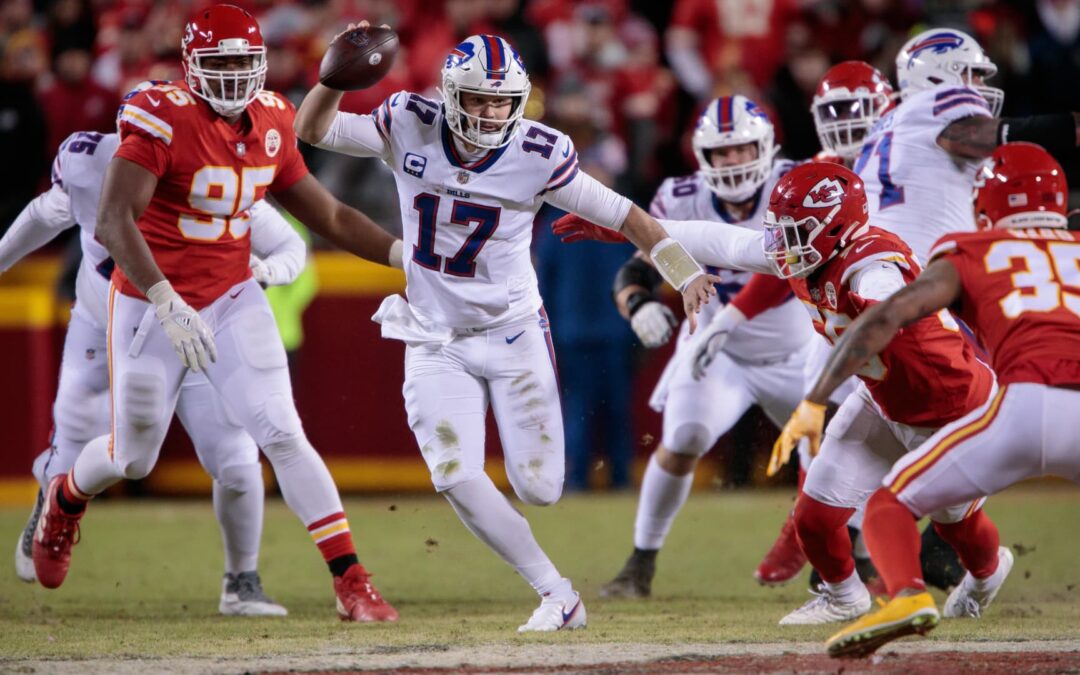Buffalo Bills quarterback Josh Allen (17) runs the ball during the AFC Divisional Round playoff game against the Kansas City Chiefs on January 23rd, 2022 at Arrowhead Stadium in Kansas City, Missouri.
William Purnell | Icon Sportswire | Getty Images
As legalized sports gambling expands across the U.S., a record 73.5 million Americans plan to wager on the NFL this season, according to the American Gaming Association’s latest survey on Americans’ betting plans released Wednesday.
Last year, an estimated 46 million people bet on the NFL in the U.S., according to the AGA.
The association said its survey found 19% of American adults plan to place a bet online, at a casino or with a bookie this year, up 56% from a year ago. Out of all U.S. adults, 35.1 million people or 14% plan to bet online, while 13.6 million or 5% plan to bet at a physical sportsbook.
Self-identified NFL fans are expected to place more bets than ever this season, with 37% projected to place a wager. That’s up 42% from last year.
Sportsbooks anticipate a boon as the first NFL game of the season kicks off Thursday.
“We expect this to be the most bet NFL season in BetMGM’s history,” Seamus Magee, trading team lead at BetMGM, told CNBC in an email.
NFL warms on gambling
The NFL was once a staunch opponent of sports gambling. But the league changed its tune when the Supreme Court in 2018 paved the way for states to legalize sports betting.
Sports betting is now legal in 34 states and Washington, D.C. In four more states, it’s legal but not yet operational.
The growth of legal gambling, and the ability for Americans to place wagers on their phones, has brought a flood of users to major players like DraftKings, FanDuel, Caesars and BetMGM. The space has proven crowded for companies, including with the entry of ESPN, but has left leagues with no shortage of business partners.
In 2021, the NFL signed five-year deals worth an estimated $1 billion combined with DraftKings, FanDuel and Caesars to become the league’s official sportsbook partners.
Then came sportsbooks at stadiums. The Washington Commanders have a physical sportsbook within their stadium. The Arizona Cardinals, who hosted last year’s Super Bowl, have one just outside their venue, as do the New York Giants and Jets outside of their shared MetLife Stadium.
NFL owners voted this year to allow sportsbooks to operate on game days in states where sports betting is legal, starting with the coming season.
Recently, the league struck a deal with Aristocrat to allow NFL-branded slot machines on casino floors across the country. And in another example of the synergies, FanDuel’s latest promotion is offering fans $100 off the NFL’s “Sunday Ticket” just for placing a small wager.
After changing its stance on gambling, the NFL appears to have found wagering on the game engages longtime fans in new ways, increases loyalty among casual viewers and establishes new revenue streams.
Gambling poses new challenges
As the league adapts to the new normal for gambling, it has also experienced growing pains. Player confusion over the league’s betting rules has led to multiple suspensions.
Over the past two years, at least 10 players have been suspended for violating the NFL’s gambling policy.
Where the money’s going
The Kansas City Chiefs are the favorites to win the Super Bowl this year, and bettors are backing them to cover the point spread in the Week 1 opener, according to BetMGM.
The sportsbook said the most bet on teams to win the Super Bowl also include the Cincinnati Bengals, Philadelphia Eagles, Buffalo Bills and Detroit Lions.
BetMGM said one bettor placed a $100 bet on the Cardinals to beat the Houston Texans in the Super Bowl in a matchup of two teams expected to finish among the league’s worst this year. If the bettor is right, that gamble would win $1 million.
At FanDuel, the Eagles receive the most bets to win the Super Bowl at 14%, followed by the Chiefs with 10%.
Philadelphia quarterback Jalen Hurts is receiving almost a quarter of the bets for MVP.









